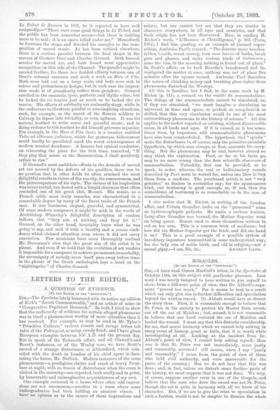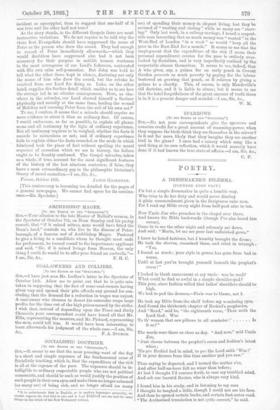MIRACLES.
LTO THE EDITOR OF THE "SPEOTATOR."]
SIR,—I have read Canon MacColl's letter, in the Spectator of October 14th, on this subject with particular pleasure. Last week I was nearly tempted to have written to you myself to show, from a different point of view, that Dr. Abbott's argu- ment "proved too much." For it seems to lead to a result which can only give rise to further difficulties and speculation beyond the written record. Dr. Abbott would have us dissect the story thus. First, it is reasonable enough to believe that St. Peter, in his anxiety to protect, his Master from arrest, cut off the ear of Malcbus ; but, second, it is not reasonable to believe that our Lord restored the ear of Malchus and healed the wound. I must say that this disturbs considerably, for me, that moral harmony which we cannot help seeking in every event of history, great or little, that it is worth while investigating at all. Looking at the incident from Dr. Abbott's point of view, I cannot help asking myself: How was it that St. Peter was not immediately, most justly and reasonably, arrested ? (Of course, when I say "justly and reasonably," I mean from the point of view of those who held civil authority, and were answerable for the peace of the country.) But we do not bear that this was done; and, in fact, unless we disturb some further parts of the history, we must suppose that it was not done. We may, of course, suppose another error in one of the Gospels, and believe that the man who drew the sword was not St. Peter, though the act is quite in harmony with all we know of hie character. But, if we are to give the reins to speculation in such a fashion, would it not be simpler to dismiss the whole incident as apocryphal, than to suggest that one-half of it was true and the other half not true ?
As the story stands, in the different Gospels there are most instructive variations. We do not require to be told why the three first Evangelists should have suppressed the name of Peter as the person who drew the sword. They had enough to record of Peter immediately afterwards,—which they would doubtless have suppressed also had it not been necessary for their purpose to exhibit human weakness in the most courageous of our Lord's followers, contrasted with His own calm self-possession. But John was bold to tell what the other three kept in silence, disclosing not only the name of him who drew the sword, but the rebuke he received from our Lord for doing so. Luke, on the other hand, supplies the further detail which enables us to see how the outrage led to no ulterior consequences. Here, as else- where in the miracles, our Lord showed himself a Saviour physically and morally at the same time, healing the wound of Malchus and rescuing Peter from the evil of his own To me, I confess, it seems that a miracle should require no more evidence to attest it than an ordinary fact. Of course, I would endeavour, as far as possible, to explain all pheno- mena and all testimony by the light of ordinary experience. But all testimony requires to be weighed, whether the facts it records be miraculous or not; and if ordinary experience fails to explain either the facts recorded or the mode in which falsehood took the place of fact without spoiling the moral sequence of causation which we see in history, the failure -ought to be frankly confessed. The Gospel miracles, taken as a whole, if true, account for the most significant features of the history of the last nineteen centuries ; if false, they leave a most extraordinary gap in the philosophic historian's theory of moral causation.—I am, Sir, &c., [This controversy is becoming too detailed for the pages of a general newspaper. We cannot find space for its continu- ance.—En. Spectator.]







































 Previous page
Previous page